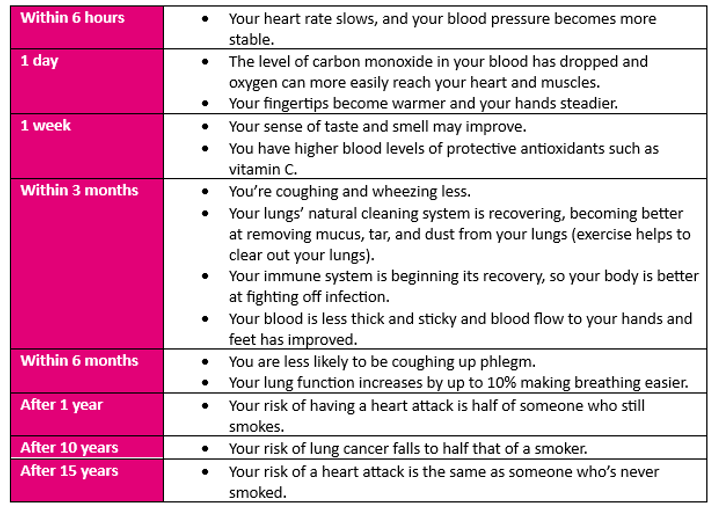It is never too late to give up smoking. Quitting smoking today improves your health and lowers your risk of developing heart disease, cancer, lung disease, and other smoking-related diseases.
Not only are there health benefits, but also financial ones; did you know that the average smoker in England spends £2,451 each year on their habit! With the cost-of-living crisis and other financial constraints on household budgets, quitting smoking would help reduce the financial burden.
Smoking is a notoriously difficult habit to break, but with help, advice, and support, you can make the positive change that will lead to a healthier you who is in control of your life, which is something to keep focused on when defeating smoking addiction.
The health risks of smoking
Quitting smoking is one of the most beneficial things you can do for your health, so to keep you focused on why you want to quit, we’ll go over some of the health risks. We all know it’s bad for us, but having the risks in front of us in black and white is always worth revisiting, so here they are:
- Nicotine can modify brain chemistry within 10 seconds of inhaling it, resulting in an elevated mood that fades within a few hours of the final cigarette.
- Causes cardiovascular disease and damages the eyes.
- Increased risk of heart attacks and strokes.
- Cancer – it is responsible for at least 15 different types of cancer, including two of the most common: lung and bowel cancers.
- Smoking can make it harder to recover from surgery.
- Can reduce fertility of both men and women.
- On average smokers live 10 years less than non-smokers.
Smoking also damages your lungs leading to conditions such as:
- Chronic obstructive pulmonary disease (COPD).
- Pneumonia.
Breaking the mental addiction to smoking
People form conditioned signals, or “triggers,” that explain why they smoke. Some people, for example, always smoke after a meal or when they are worried. These triggers cause behaviour habits that are difficult to break.
To help you to mentally prepare to give up smoking the use of CBT therapy (Cognitive Behavioural Therapy) is a type of talking therapy that teaches you how to manage harmful thinking; it involves learning to break the cycle of negative thinking. It offers you coping skills for dealing with various issues by concentrating on how your thoughts, beliefs, and attitudes affect your feelings and behaviours.
CBT has been shown to be particularly helpful in helping smokers quit, for example, by changing habits such as smoking after a meal and providing coping skills and techniques to control cravings.
Prepping your home for quitting
It’s a good idea to prepare your home for when you quit smoking in order to stay focused and to remove any temptation or ‘triggers’ in and around your home.
- Remove ashtrays, lighters, matches, cigarettes, and any storage containers associated with smoking.
- Clean – fabrics as they retain the smell of smoke, such as curtains, rugs, clothing etc.
- Cravings – store healthy snacks, sugar-free gum or sweets, puzzles and games, books and magazines you’ve been meaning to read to help distract you when you have a craving.
- Re-arrange – if you smoked in a particular room in your house or in your garden then rearrange the furniture or change it up with some plants and motivating items.
What to expect when you quit smoking
Withdrawal can be difficult, but looking at the symptoms as indicators that your body is recovering can help. Cravings, restlessness, difficulty concentrating or sleeping, irritability, anxiety, increased hunger, and weight gain are all common withdrawal symptoms.
What happens to your body when you quit smoking?

Distraction tips for when you get cravings
Quitting is challenging, and it is helpful to have some distraction strategies to take your mind off the craving till it passes. Here are some ideas to consider when you crave a cigarette:
- Exercise, such as going for a brisk walk, can help reduce nicotine cravings and alleviate withdrawal symptoms.
- Stay busy – read a book or play a game on your phone – your mind and hands will focus on something else until the craving passes.
- A change of scenery – try moving to another room or going outside.
This is not an exhaustive list, but choosing tasks that keep your hands busy and your mind focused on other things will help you until the craving passes.
You’re not alone – where you can get support and help to quit
It’s a good idea not to try to quit through willpower alone, as this is the least effective method used by nearly half of all smokers in England. If a person uses a stop smoking medication recommended by a doctor, pharmacist, or other health expert, their chances of stopping are doubled.
Help is available in the form of:
- Nicotine replacement aids – skin patches, chewing gum, e-cigarettes, and nasal sprays can be beneficial, especially when coupled with support from a stop smoking service.
- Local stop smoking programmes– combining stop smoking aids with local expert support increases the likelihood of quitting smoking by three times.
- Download the NHS quit smoking app – it’s free, you can track your progress, see how much you are saving and also get daily support.
It is a good idea to set a ‘quitting smoking’ date, make sure you tell your friends, family, and work colleagues so they can support you.
- Book an appointment with your GP who will be able to prescribe (if you feel you need it) prescription medication to help you quit.
Remember that if you get help, you are three times more likely to quit smoking. Don’t worry if you slip up and start smoking again; it’s only a minor setback; the most important thing is to get back on track. You can do it!





